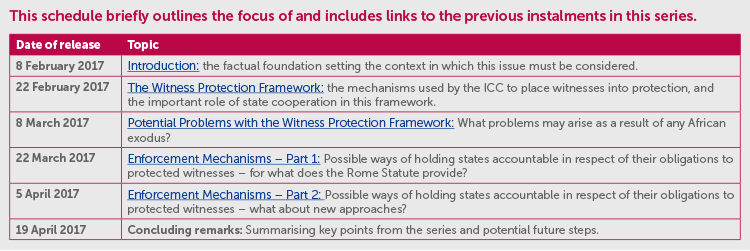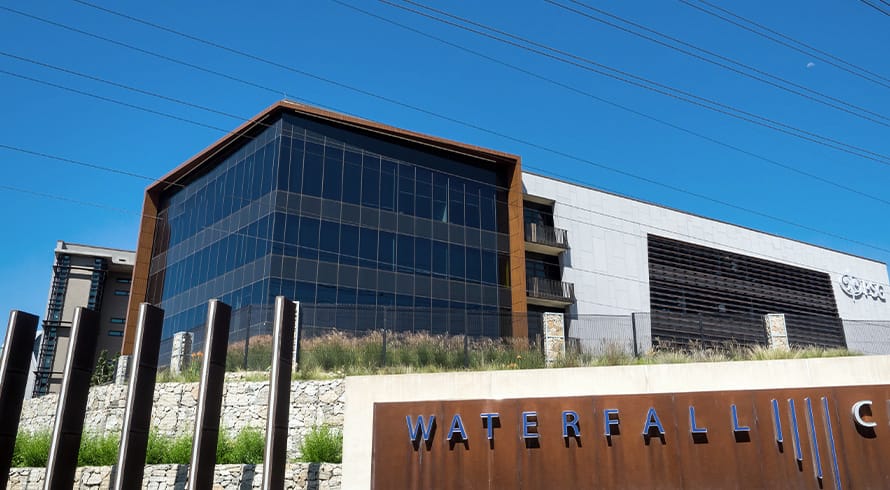What next for ICC witness protection?
The threat of an African exodus is constantly in flux. In January 2017, the African Union adopted a non-binding resolution (opposed by Nigeria and Senegal) in which it called on African states to follow its recommended withdrawal strategy. However, South Africa and Gambia have since terminated their withdrawal procedures. As it is open to these states and any others to begin withdrawal procedures at any stage, this does not rule out the possibility of a walkout.
If there is an African exodus despite the continuously shifting rhetoric on the ICC, it will not happen overnight: it will take time-consuming legislative action in each of the African states to reach a point where the relevant government is empowered to notify the United Nations (UN) of the withdrawal. South Africa’s attempted withdrawal is an apt example of this point. As we analysed in a previous alert, the executive decision to deliver a notice of withdrawal prior to obtaining parliamentary approval was declared invalid by the High Court because it violated s231(2) of the Constitution and breached the doctrine of separation of powers. Even once a valid notice of withdrawal is delivered to the UN, that withdrawal will only come into force a year later under article 127(1) of the Rome Statute of the International Criminal Court (Rome Statute).
Regardless of whether there is a mass withdrawal or a small number of exiting states, there will be problems of witness safety and risk mitigation faced by the Victims and Witnesses Section (VWS) at the Court. These include the need to reassess the risk to relocated witnesses, a reduction in potential protective states and the lack of a suitable enforcement mechanism to ensure states comply with their witness protection obligations. However, these problems do not go much beyond the flaws already inherent in the witness protection framework. It is therefore necessary for the Court to address these problems as soon as possible, given that they may materialise regardless of a withdrawal. There is time, due to the prolonged withdrawal process, so the Court must take advantage of this opportunity to improve and reinforce the ICCPP. Pre-emptive action through, for example, considering the risk factor posed by the protective country’s attitude towards the ICC, or the ability to bring urgent, confidential proceedings before domestic courts, should mitigate the current problems, and those that may be expected upon mass withdrawal.
As it stands, there is no viable solution to the potential ramifications identified in this series absent additions to the Rome Statute or operational changes to the VWS. This is a disturbing conclusion to reach given the importance of witnesses in the prosecution of atrocity crimes, and the need for their protection to ensure full participation.
The next steps need to be taken by the ICC itself to determine ways in which to best address these problems. However, without a combined effort by all parties involved in the attempt to end impunity on an international level, these problems may become real in the lives of witnesses and terrible, irreversible consequences may result.
The information and material published on this website is provided for general purposes only and does not constitute legal advice. We make every effort to ensure that the content is updated regularly and to offer the most current and accurate information. Please consult one of our lawyers on any specific legal problem or matter. We accept no responsibility for any loss or damage, whether direct or consequential, which may arise from reliance on the information contained in these pages. Please refer to our full terms and conditions. Copyright © 2026 Cliffe Dekker Hofmeyr. All rights reserved. For permission to reproduce an article or publication, please contact us cliffedekkerhofmeyr@cdhlegal.com.
Subscribe
We support our clients’ strategic and operational needs by offering innovative, integrated and high quality thought leadership. To stay up to date on the latest legal developments that may potentially impact your business, subscribe to our alerts, seminar and webinar invitations.
Subscribe




